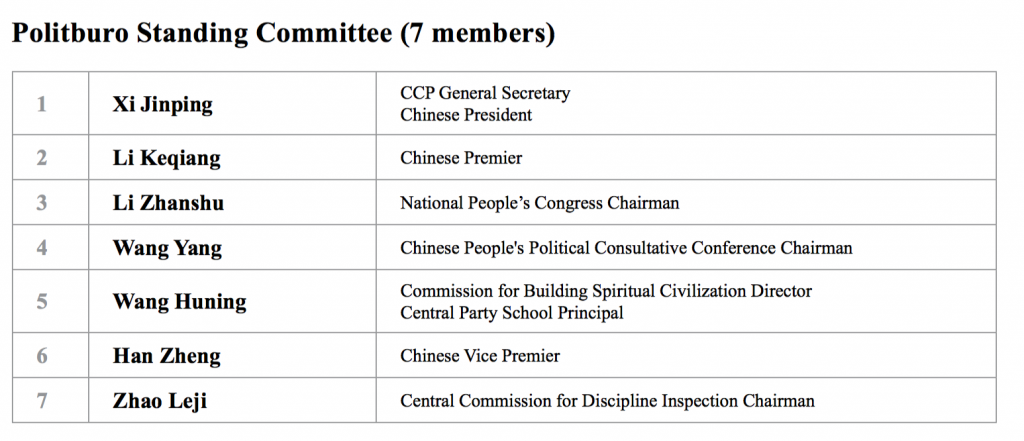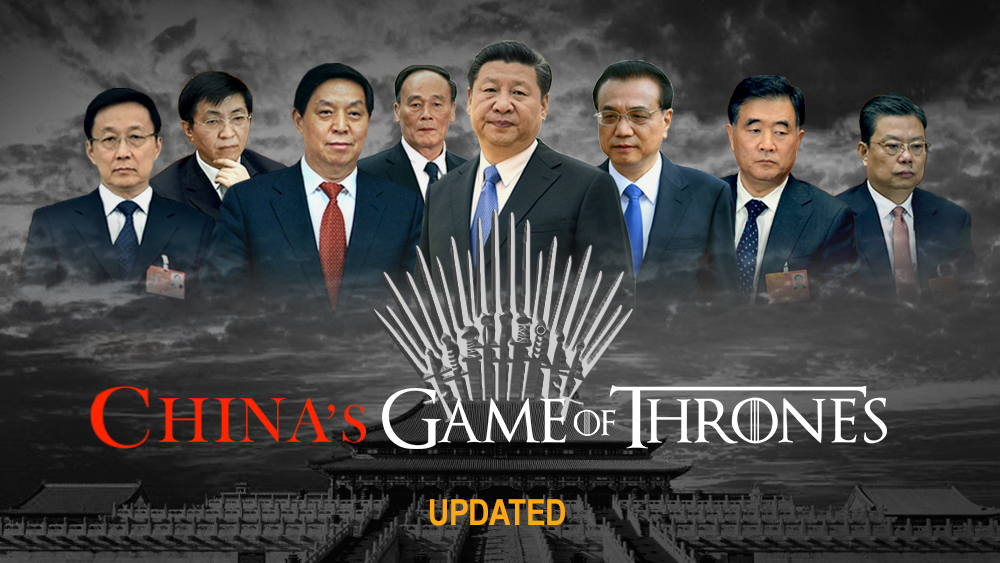◎ Xi will flexibly interpret existing Communist Party norms to achieve two goals.
In parsing the communiqué released after the 18th Central Committee’s 7th plenary session on Oct. 14, SinoInsider believes that the degree of Xi’s power consolidation at the 19th Congress falls somewhere between two scenarios we considered to have the highest probability of occurring. (See all of our five scenarios here.)
Based on our latest intelligence, we believe that the collective leadership system will likely be retained at the 19th Congress. Xi, however, will flexibly interpret existing Communist Party norms to achieve two goals:
- Keeping Wang Qishan in office to oversee the anti-corruption effort.
- More complete consolidation of power.
In the light of new information, we present an updated Politburo Standing Committee scenario. The updated name list closely resembles “Scenario 4~Name List B” of our original Standing Committee forecast, but with Xi having centralized power to a much higher degree.
Flexible interpretation
In our earlier report, we noted that Xi must take two key actions to sway the 19th Congress in his favor:
- Fully consolidate power while resisting interference by Party elders and the collective leadership system.
- Keep close ally Wang Qishan in office to preserve the results of the anti-corruption campaign and maintain its momentum for the next five years.
An analysis of the 7th plenum communiqué suggests that Xi has already secured his first objective via flexible interpretation of CCP norms, and will likely achieve his second objective using the same method.
Xi as ‘General Secretary Plus’
- In the communiqué, listed after the political theories of past CCP leaders (Mao Zedong Thought, Three Represents, etc.) is the formulation: “General Secretary Xi Jinping’s series of important speeches and new concepts, new thought, and new strategies on the governance of the country.”
- A political theory is analogous to a distinguished title. Titles have been very important in China since ancient times and particularly so under the communist dictatorship.
- We earlier analyzed that the wording of the political theory which Xi will add to the CCP constitution will take guidance from the formulation in the communiqué.
- The inclusion of the words “General Secretary Xi Jinping” suggests that the CCP considers Xi to be below Mao in standing, but significantly above Jiang Zemin and Hu Jintao.
- Unlike Mao, Jiang and Hu’s political theories are not prefaced by their names.
- According to the communiqué, Xi’s position is restricted to “General Secretary.” This suggests that the collective leadership model should still be in place after the 19th Congress. Xi, however, might have similar levels of authority as he would have under a Chairman system.
- Even if Xi’s name is added to the CCP constitution with the position “General Secretary,” his stature in the Politburo Standing Committee will be greatly elevated above the other members. Under the current system, Xi is merely “first among equals.”
- Earlier in the year, the Xi camp opened a high bargaining price by spreading information in CCP publications and overseas media that Xi wanted to add “Xi Jinping Thought”—a political theory on par with Mao’s—into the CCP charter, and that Xi was considering the implementation of a Chairman system.
- Likely facing pushback from the various factions, Xi then appears to have exchanged taking the title of “CCP Chairman” and adopting an unrestricted political theory to instead become a “General Secretary Plus” with powers approximating that of a CCP Chairman.
Unofficial Politburo Standing Committee member Wang
- In order to break the CCP’s retirement norms and keep Wang Qishan in office, Xi Jinping likely compromised with various Party factions in the following ways:
- Abandon taking on the title of “CCP Chairman.”
- Abandon the inclusion of an unrestricted political theory like “Xi Jinping Thought” to the CCP charter.
- Agree to not include Wang in the Politburo Standing Committee.
- Agree to remove Wang as Central Commission for Discipline Inspection (CCDI) head.
- Xi, however, likely found positions for Wang that would still qualify him to serve on the Politburo—and as a de facto Politburo Standing Committee member.
- The Politburo is comprised of five groups of high-ranking officials:
- National and State Council apparatus: Chinese vice president, Chinese vice premier.
- Party affairs apparatus: Propaganda Department head, Organization Department head, CCP General Office head, CCDI deputy head.
- National People’s Congress (NPC) and Chinese People’s Political Consultative Conference (CPPCC) apparatus: NPC deputy heads and CPPCC deputy heads.
- Provincial apparatus: Party secretaries of important provinces or regions.
- Military: Central Military Commission vice chairman
- Wang could very likely secure a Politburo seat if Xi appoints him as Chinese vice president.
- Xi could also make Wang deputy leader of the Foreign Affairs Leading Group and the Central Coordination Group for Hong Kong and Macau Affairs.
- The Jiang faction has long controlled China’s foreign affairs apparatus, as well as the agencies overseeing Hong Kong, Macau, and Taiwan affairs. As a result, these various foreign affairs organs have created an array of problems for Xi over the past five years.
- Should he be appointed as their overseer, Wang will help Xi clean out Jiang faction influence from the various foreign affairs agencies.
- Wang meeting international VIPs (Steve Bannon, Singapore leader Lee Hsien Loong, Cambodian deputy prime minister Men Sam An) in late September may already signal his becoming Chinese vice president with a foreign affairs portfolio.
- Wang will likely serve as director of the National Supervisory Commission (NSC) when it is inaugurated by the NPC in March 2018.
- In our earlier report, we mentioned that the CCDI should see its powers reduced and transferred to the NSC. The CCDI chief may also become a deputy NSC director under Wang. In this scenario, Wang’s authority over anti-corruption affairs will in fact increase rather than diminish after stepping down as CCDI chief.

Conclusion
- Xi Jinping’s name will be included in the CCP constitution, and his political status in the Politburo Standing Committee will far surpass that of the other members.
- Xi’s political authority as a “General Secretary Plus” should approximate that of a CCP Chairman.
- Han Zheng will be the only remaining Jiang faction member in the Politburo Standing Committee.
- As head of the National Supervisory Commission, Wang Qishan’s authority will be expanded as he will have jurisdiction over both Party and state apparatus.
- If Wang is appointed Chinese vice president and handed diplomatic portfolios, he may perform a role similar to the United States Secretary of State.
Contact us for in-depth analysis.












